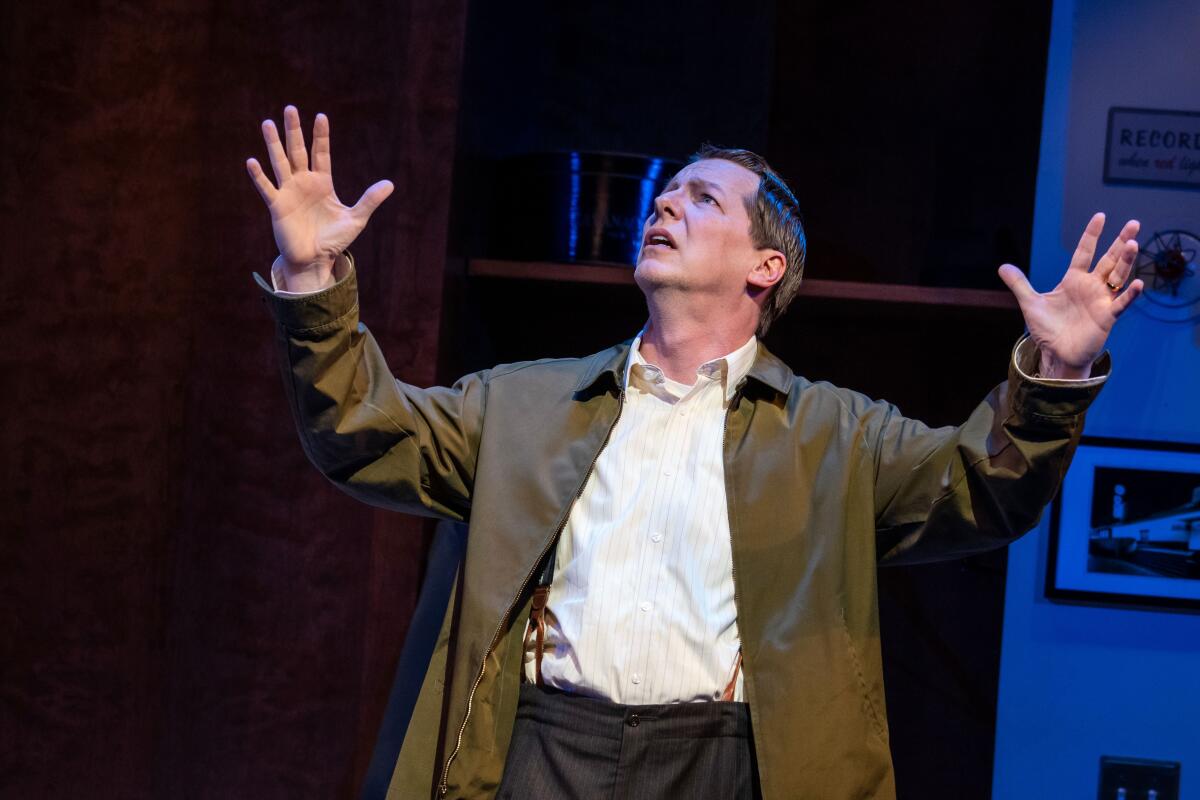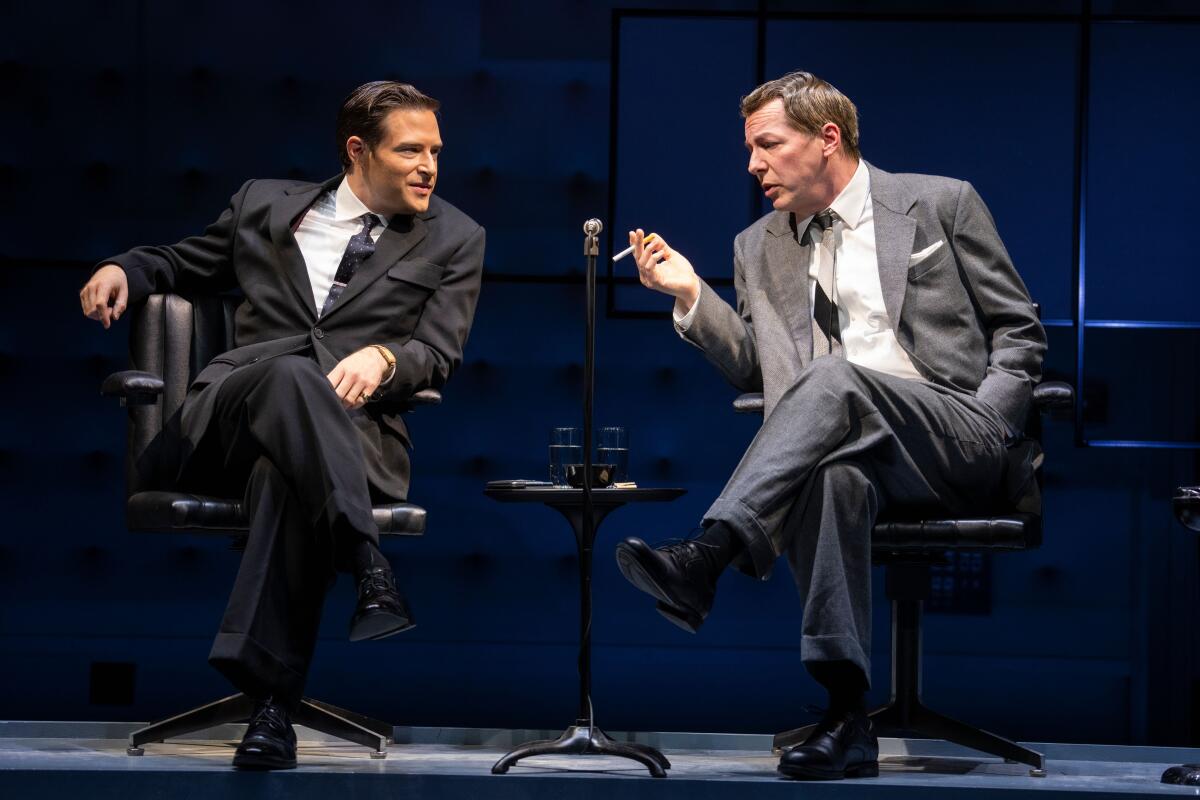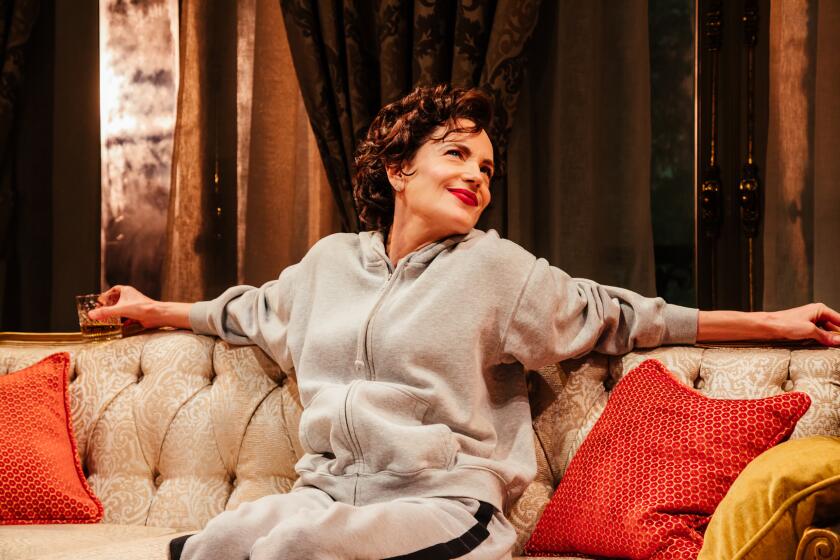Unhappiness made Oscar Levant a laugh riot. Sean Hayes carves a portrayal in a marble of suffering

- Share via
NEW YORK — Oscar Levant, one of the great interpreters of George Gershwin’s music, was as renowned for his rueful wit as he was for his virtuosic piano skills.
His wisecracks made him a favorite of television hosts in the 1950s, even if network executives held their breath whenever he was on the air. A shambling, melancholic truth-teller, with a talent for riling up censors, Levant said things that weren’t supposed to be spoken aloud on national TV.
Unhappiness made him a laugh riot. Behind the clever ripostes was a mind on the rack. Levant was a crackup in every sense.
In “Good Night, Oscar,” a new Broadway play by Doug Wright (the Pulitzer Prize-winning author of “I Am My Own Wife”), the painful source of this humor is exposed. Levant, portrayed in all his hobbled hilarity by Sean Hayes, becomes the subject of an unusual Freudian case study.
A new psychopathology is identified — the Gershwin complex. The Levant of Wright’s dramatic comedy, which had its premiere last year at Chicago’s Goodman Theatre, suffers from being a footnote in the short, brilliant career of the composer who inspired his talent and revealed its limitations.
Having accepted that he’d never write a piece of music as sublime as Gershwin’s “Rhapsody in Blue,” Levant adopted the role of court jester to showbiz royalty. As addicted to minor fame as he is to Demerol, he lives to exchange clever repartee with Hollywood types, even though he knows he’ll hate himself in the morning (to say nothing of afternoon and night).
No stranger to zingers from his years of playing Jack McFarland on “Will & Grace,” Hayes submerges himself in the despair and despondency that were the fuel for Levant’s storied wit. The character never has to search long for a bon mot. But for all the drollery, the performance seems carved in a marble of suffering.
Quips are delivered but the only one who isn’t laughing is Levant, whose entire body seems weighed down by an inner gravity. Hayes never lets us forget that the curmudgeonly wag being entertainingly outrageous is receiving electroshock treatments.
The setup for the play, which had its official opening on Monday at the Belasco Theatre under the direction of Lisa Peterson, has the simplicity of a vintage sitcom. A laugh track wouldn’t at all be amiss.
The writing, especially in the early going, seems to be taking its cues from such TV classics as “The Dick Van Dyke Show” and “Father Knows Best.” And the TV studio set by Rachel Hauck, the costumes by Emilo Sosa and the hair and wig design by J. Jared Janas vacuum-seal us in the television version of 1958, when the play takes place.

The network has asked Jack Paar (Ben Rappaport) to move his late-night talk show to the West Coast for sweeps week. Paar has agreed under the stipulation that he can have Levant on his debut L.A. broadcast.
Ratings may be all any of the suits at NBC care about, but Paar is not about to water down his content. As he explains to NBC President Bob Sarnoff (Peter Grosz), he needs guests who “treat chit-chat with all the daring, all that danger of a high-wire act.”
But unbeknownst to Paar, Levant has been recently committed by his wife, June (Emily Bergl), to a psychiatric facility. Levant’s guest appearance comes courtesy of a medical furlough that June arranged under false pretenses.
When Levant finally shows up at the studio, he’s in the company of a hospital orderly named Alvin Finney (Marchánt Davis), who’s guarding a valise of prescription drugs and wondering how he got bamboozled into this crazy scheme. As Max Weinbaum (Alex Wyse), a callow production assistant, tries to get the evening’s temperamental guest ready for airtime, all Levant can think of is how he can break into the candy store of meds.
Wright, who wrote the book for the musical “Grey Gardens,” is operating on a reduced scale. The play traffics in TV tropes and formulas. The stakes are artificially inflated so that we’re meant to believe that the future of independent television, and not just Levant’s well-being, are on the line with this perilous broadcast.
It’s hard to imagine ‘Ava: The Secret Conversations’ getting produced at the Geffen Playhouse without Elizabeth McGovern on the marquee as the show’s star.
“Good Night, Oscar” provides a vehicle for Hayes to be snappy and tragic. Ironically, his performance is the least sitcom-y thing in the production. The weight of Levant’s mental illness comes through with powerful monotony. This condition isn’t a costume that can be discarded at will.
I didn’t buy the business with Gershwin (John Zdrojeski), who makes ghostly visitations that exacerbate Levant’s envy and self-doubt. The psychiatric distress of Hayes’ Levant isn’t susceptible to simple explanations. The character may be living his professional life in the shadow of a superior artist, but the roots of his disorder must be more multifaceted.
YouTube video of Levant on Paar’s show (which changed names and eventually became “The Tonight Show” that Johnny Carson turned into a dynasty) verify the unusual dynamic between an uncompromising talk-show host and his unstable genius guest. The play doesn’t dig deeply into Paar’s character. Rappaport reveals the conversational smoothness and the feisty recalcitrance, but there’s more complexity to be discovered.
Bergl’s June, sane and strong-willed, is just wacky enough in her devotion to make her seem like the creation of an all-male room of TV comedy writers. Not until the end does the marital bond between Oscar and June become acutely poignant.
Hayes, an accomplished piano player, delivers a mini concert of Gershwin that pays homage to Levant’s impassioned artistry. Paar isn’t the only one who is blown away by his guest’s performance. The audience at the Belasco is equally dazzled by Hayes’ prowess and flair.
More to Read
The biggest entertainment stories
Get our big stories about Hollywood, film, television, music, arts, culture and more right in your inbox as soon as they publish.
You may occasionally receive promotional content from the Los Angeles Times.












